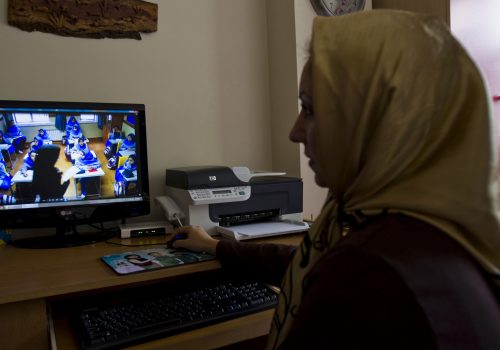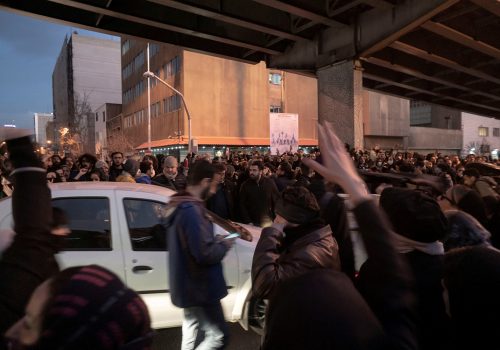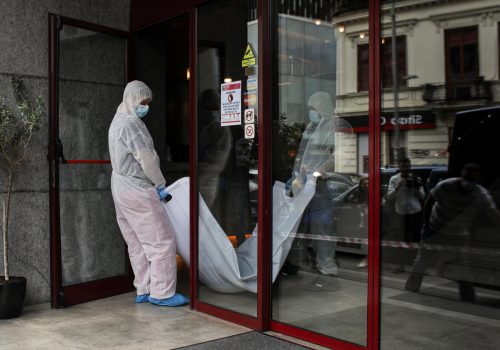A year after the November protests, human rights violators have not been held accountable in Iran
به زبان فارسی بخوانید
یکسال بعد از تظاهرات آبانماه ۱۳۹۸ ناقضان حقوق بشر هنوز پاسخگو نیستند
وضعیت سیاسی اشفته برای ایرانیها عادی است. آینده سیاسی مسئولان ایرانی بر پایه تمایلات رهبر انقلاب، کسی که بدون انتخاب شدن و مسئولیت پذیری از سال ۱۳۶۷ بر بالاترین مسند قدرت در کشور نشسته است، پیش می رود. با این حال حتی با وجود تغییرات حتمی در آینده سیاسی کشور یک حقیقت تلخ تغییرناپذیر است و آن مصونیت همیشگی مسئولان سیاسیکشور از مجازات برای جرایم حقوق بشری آنها می باشد.
سال ۲۰۲۰ میلادی (۱۳۹۸-۹۹ شمسی) هم از این قایده مستثنی نبود. این هفته اولین سالگرد تظاهرات سراسری علیه دولت در ایران می باشد که در ۲۴ آبان ۱۳۹۸ شروع شد و به تظاهرات آبانماه معروف است. تظاهرات با سرکوب خشونت بار دولت روبرو شد: صدها تظاهرکننده مسالمت آمیز توسط نیروهای امنیتی دولتی کشته شدند و هزاران نفر زندانی شدند. تاکنون هیچ مامور دولتی مسئول کشتار و انجام این اعمال خشونت امیز شناخته نشده است. در عوض در میان این فضای مصونیت بار برای ماموران دولت، جمهوری اسلامی صدها تظاهر کننده که فقط به صورت مسالمت آمیز در حال استفاده از حق آزادی بیان و تشکیل اجتماع خود بودند را متهم به جرایم مختلف علیه امنیت ملی کرده و قوه قضاییه نیز تظاهرکنندگان را بر اساس اعترافاتی که زیر شکنجه گرفته محکوم کرده است.
متعاقب سرکوب خشونت بار تظاهرکنندگان، در دیماه ۱۳۹۸ گروههای مدافع حقوق بشر خواستار برگزاری جلسه ویژه شورای حقوق بشر سازمان ملل متحد شدند تا به بررسی خشونتها بپردازند. مدافعان حقوق بشر امکان وقوع شکنجه و اعدامهای سراسری در زندانهای ایران را هشدار دادند. با این حال این درخواستها از طرف جامعه جهانی با درهای بسته مواجه شدند. می توان این عدم اقدام را ناشی از خستگی کشورهای عضو دانست بعد از ماهها تظاهرات ضد دولتی در کشورهای مختلف از شیلی تا هنگ کنگ که همه باسرکوب خشونت بار دولتی مواجه شده بودند. مدت کوتاهی بعد، همه گیری ویروس کرونا دنیا را به نقطه ایست اورد و باعث تعویق جلسات سازمان ملل و کند شدن روند فعالیتهای سیاسی و مذاکرات جهانی شد که تا امروز ادامه دارد.
اما روند کند واکنش به پرونده حقوق بشر ایران را همچنین می توان مرتبط با خستگی خاص ناشی از مسایل ایران دانست، که شامل عدم تایید قدرتهای جهانی از بیرون کشیدن یکطرفه دولت ترامپ از برجام و فشار مداوم و مضاعف آن دولت بر ایران می باشد. با تشدید خصومت بین واشنگتن و تهران، متحدین اروپایی ایالات متحده تمرکزشان را بر نجات سیاست خود درباره پرونده اتمی ایران گذاردند که در آن فضای اندکی برای توجه به نقض حقوق بشر در ایران باقی مانده بود. وقتی ایالات متحده در خرداد ۱۳۹۷ از شورای حقوق بشر سازمان ملل متحد خارج شد فشار ناشی از ان بر کشورهای اروپایی راهی برای پاسخگویی محکم و چندجانبه به خشونتهای ناشی از تظاهرات آبانماه را باقی نگذاشت.
اما اکنون که ایالات متحده رییس جمهور جدیدی دارد و امکان بازگشایی برجام در لیست کاری اوست بن بست سیاسی بین قدرتهای جهانی درباره روش برخورد با ایران نیز امکان بازگشایی دارد. اما این بازنگری همچنان این مسئولیت را به همراه دارد که تضمین شود موارد نقض حقوق بشر با هدف آشتی با دولت جمهوری اسلامی حول محور پرونده اتمی ایران به حاشیه رانده نشوند. بر اساس قوانین بین الملی، کشورها مسئولند که به حقوق بشر افرادی که درون مرزهای آنها زندگی می کنند احترام بگذارند و این حق را تامین کنند. تامین حقوق بشر شامل تعهد برای تحقیق، پیگرد قضایی و مجازات اشخاصی که مرتکب موارد نقض حقوق بشر شده اند می شود. این قسمتی از پروسه عادلانه و بیطرف قضایی است. بر اساس قانون بین المللی حقوق بشر، قربانیان و بازماندگان موارد نقض حقوق بشر حق برخورداری از عدالت، دانستن حقیقت و جبران خسارت را دارند.
در حالت ایده آل، عدالت توسط مسئولان ایرانی متعاقب با بررسی موارد نقض و مجازات مرتکبان درون حکومت اجرا می شود که با تعهدات بین المللی حقوق بشر مطابقت می کند. متأسفانه این یک سناریو واقع بینانه نیست. ریاست قوه قضاییه ایران بر عهده ابراهیم رئیسی است، شخصی که خود نقشی اساسی در اعدام هزاران زندانی سیاسی در زندانهای ایران در تابستان ۱۳۶۷ داشت. تا زمانی که رئیسی بر مسند ریاست قوه قضاییه نشسته است بسیاری از موارد نقض از قوه قضائیه شروع می شود. در مواردی که از نظر سیاسی «حساس» تلقی می شوند، نبودن دادرسی عادلانه و وجود مجازات های نامتناسب و سنگین قاعده اصلی روند دادرسی را شامل می شوند.
در این چارچوب سرکوبگرانه است که متأسفانه برخی از مهمترین نگرانیهای مدافعان حقوق بشر پس از اعتراضات آبان ۱۳۹۸ به ثمر نشست. از آن جمله حکم اعدام سه مرد جوان است که در اعتراضات شرکت کرده بودند و پس از اعتراضات گسترده جهانی اعدامشان متوقف شد. همچنین اعدام نوید افکاری، قهرمان کشتی ایران که در جریان موج اعتراضات سراسری در دیماه ۱۳۹۷ دستگیر و بعد از آن متهم به جرایمی شد که به آنها زیر شکنجه اعتراف کرده بود و متعاقبا به اعدام محکوم شد.
اگر کشورها در برقراری مجدد روابط با ایران وضعیت داخل ایران را نادیده بگیرند، این کار به ضرر خودشان است. از زمان تصویب برجام ، مردم ایران دست به اعتراضات گسترده و سراسری در آذر و دیماه ۱۳۹۷، و آبانماه ۱۳۹۸ زده اند. اعتراضات پراکنده تا امروز ادامه دارد. محرک اساسی این ناآرامی ها شامل نارضایتی ناشی از فساد گسترده دولتی و سرخوردگی از چشم انداز اصلاحات می باشد و نشاندهنده این است که اعتراضات ادامه خواهند داشت، به ویژه در غیاب تغییرات گسترده مدنی، سیاسی و اقتصادی.
اخیرا، نشانه هایی وجود دارد که عده ای در سه کشور اروپایی عضو برجام (المان ایتالیا و فرانسه) این حقیقت را درک می کنند، مثلا نمایندگان پارلمان آلمان در ماه سپتامبر با تعلیق موارد پیشنهادی خواستار معیارهای روشن حقوق بشری در معاملاتشان با جمهوری اسلامی شدند. با توجه به این اولویتها، در رابطه با هرگونه برقراری مجدد روابط با جمهوری اسلامی، دولتهای مربوطه (و این شامل رییس جمهوری جدید ایالات متحده جو بایدن نیز می شود) باید خواستار موراد زیر باشند:
- آزادی کلیه زندانیان سیاسی.به نسرین ستوده ، وکیل برجسته حقوق بشر ایرانی، در ۱۷ آبان ماه به طور موقت از زندان به مرخصی آمد، اقدامی که باعث افزایش امیدها برای آزادی دائمی وی و آزادی سایر زندانیان عقیدتی در ایران شد. هزاران زندانی در ماه بهمن آزاد شدند تا از گسترشبیماری کورونا در زندان های ایران جلوگیری شود، اما این آزادی ها عموماً شامل زندانیانی که به اقدام علیه امنیت ملی محکوم شده اند نمی شود. اقدام علیه امنیت ملی اتهامی است که اغلب علیه کسانی که از حق آزادی بیان و حق برگزاری تجمعات خود به طرز مسالمت آمیز استفاده می کنند زده می شود. آزادی از زندان باید شامل همه زندانیان عقیدتی یعنی هر کس که به جرم شرکت در تظاهرات مسالمت آمیز زندانی شده است بشود.
- پایان به مجازات اعدام.بعد از چین جمهوری اسلامی بالاترین امار اعدام در جهان را داراست. حتی کسانی که به دلیل استفاده از حق آزادی بیان دستگیر می شوند به اعدام محکوم می شوند. جمهوری اسلامی باید فوراً به صدور حکم اعدام برای زندانیان عقیدتی و موارد دیگری که در مخالفت با قوانین بین المللی است پایان دهد.
- راه اندازی رسیگی مستقل از طرف سازمان ملل. کشورهای عضو باید به خواسته های جامعه مدنی توجه کنند و خواستار تاسیس گروه تحت نظر سازمان ملل برای رسیدگی به ادعاهای نقض شدید حقوق بشر، مانند قتل های غیرقانونی، شکنجه و ناپدید شدن اجباری، که از ۲۴ آبان ۱۳۹۸ در ایران صورت گرفته است بشوند. گروه رسیدگی باید یافته های خود را با سعی در اطمینان از پاسخگویی و تضمین عدم تکرار به شورای حقوق بشر سازمان ملل گزارش دهد. این گزارش باید شامل توصیه هایی درباره چگونگی اطمینان از پایبندی جمهوری اسلامی به تعهدات خود در زمینه حقوق بشر، از جمله در زمینه اعتراضات و پیامدهای ناشی از آن، و همچنین محاکمه مرتکبین موارد جدی نقض حقوق بشر در دادگاه های عادلانه باشد.
از آنجایی که دولت بایدن خواستار بازگشت به برجام است، ممکن است برخی از کشورها تمایل داشته باشند که معاملات را از همانجایی که در خاتمه دوران ریاست جمهوری اوباما در سال ۱۳۹۵ رها شدند از سر بگیرند. اما این برخورد نمیتواند واقعیتی تغییر یافته را منعکس کند و قطعا نمی تواند آینده جنبش های مردمی در سراسر جهان که خواستار تغییر هستند را بازتاب بدهد. مسئول قراردادن مقامات جمهوری اسلامی که آمران نقض فاحش حقوق بشر در آبان ۱۳۹۸ و بعد از آن هستند آغاز خوبی است.
Iranians have grown accustomed to turbulent politics. The political fortunes of officials in Iran wax and wane on the whims of Supreme Leader Ayatollah Ali Khamenei, the Islamic Republic’s unelected and unaccountable head of state, who has occupied the office since 1989.
However, amid changes in political futures, one sad reality stays constant: the enduring impunity of Iran’s leadership for gross human rights violations.
2020 has proved to be no exception to this rule. This week marks one year since anti-government protests erupted in Iran on November 15, 2019—known as the Aban protests—and quickly spread nationwide. The demonstrations were met with a violent response by the state; hundreds of peaceful protesters were killed by security forces and thousands more were jailed. To this day, no government officials or perpetrators of the killings have been held responsible.
Instead, amid this climate of impunity, the Islamic Republic has brought national security charges against hundreds of protesters simply for peacefully exercising their rights to freedom of expression, association, and assembly, and Iran’s judiciary has convicted protesters on the basis of confessions obtained under torture.
In the aftermath of the Islamic Republic’s violent crackdown on protesters, human rights organizations called for a special session in December 2019 of the United Nations Human Rights Council (UNHRC) to address the violations. Human rights defenders warned of the prospects of rampant torture and mass executions of protesters in Iran’s jails.
However, these calls were largely met with silence from the international community. This may be attributed in part to a general weariness from states after months of anti-government protests from Chile to Hong Kong to Iraq in 2019, which were all marked by state violence. Shortly afterwards, the coronavirus pandemic brought the world to a standstill, with UN meetings postponed and the pace of diplomacy and engagement operating at a slower clip—the lag continuing to this day.
But the lethargy in taking action on Iran’s human rights record can also be attributed to weariness specific to the Iran context as well, including world powers’ disapproval of the Trump administration’s unilateral pullout from the Iran nuclear deal in May 2018 and the continued intensification of its “maximum pressure” campaign. The rising hostilities between Washington and Tehran had European allies of the United States focused on salvaging diplomacy on the nuclear file, with little appetite or bandwidth for addressing the Islamic Republic’s gross human rights violations. With the US withdrawal from the UNHRC in June 2018 and a stretched Europe, there were few paths left for a robust multilateral response to the violence against protesters.
However, with a new US president and the possibility of a reset where the Joint Comprehensive Plan of Action (JCPOA) is concerned, the political impasse between world powers on how to engage with Iran may be coming to an end. With that repositioning comes an obligation to ensure that human rights concerns are not swept to the side in a desire to placate the Islamic Republic in negotiations on the nuclear file.
Under international law, states have an obligation to respect and ensure the human rights of persons within their territory. Ensuring human rights includes investigating, prosecuting and punishing individuals who have committed human rights violations as part of a fair and impartial process. Victims and survivors also have the right to justice, truth, and reparations.
Ideally, justice would be served by the Iranian leadership investigating violations and punishing perpetrators within their ranks. Unfortunately, that is not a realistic scenario. Iran’s judiciary is headed by Ebrahim Raisi, a man who played a key role in the summary executions of thousands of political prisoners in Iran’s jails in the summer of 1988. With Raisi at the helm, many violations originate in the judiciary and a lack of fair trials and disproportionately heavy sentences operate as the norm in cases deemed “politically sensitive.”
It is within this repressive framework that some of the top concerns of human rights defenders unfortunately came to fruition, including death sentences against three young men who participated in the protests—which were halted after a global outcry—and the execution of Navid Afkari, an Iranian wrestling champion who had been arrested during a prior wave of nationwide protests in January 2018 and sentenced to death based on confessions allegedly obtained under torture.
If states ignore this on-the-ground reality in a reset of relations with Iran, they do so at their own peril. Since the adoption of the JCPOA, the Iranian people have engaged in widespread, nationwide protests in December 2017 to January 2018 and November 2019, with sporadic protests continuing to this day. The underlying factors prompting this unrest—such as dissatisfaction with rampant state corruption and disillusionment in prospects for reform—mean that protests are likely to continue, especially in the absence of sweeping civil, political and economic change.
Recently, there are some signs that some in the E3—Britain, France, and Germany—understand this. For example, parliamentarians in Germany tabled motions in September calling for clear human rights benchmarks in dealings with the Islamic Republic.
With those priorities in mind, governments should call for the following in any renewed engagement with Iran:
- Prominent Iranian human rights lawyer Nasrin Sotoudeh was granted temporary leave from prison on November 7, a move that raised hopes for her permanent release and the release of other prisoners of conscience in Iran. Thousands of prisoners were released in February to stop the spread of COVID-19 in Iran’s jails. But these releases generally did not extend to prisoners convicted of national security offenses, which is a charge often levied against those peacefully exercising their rights to freedom of expression, association, and assembly. Releases should extend to all prisoners of conscience, including anyone jailed for participation in peaceful protests.
- The Islamic Republic remains the world’s biggest executioner after China and the application of the death penalty extends to those penalized for their freedom of expression. The Islamic Republic must bring an immediate end to the application of the death penalty to prisoners of conscience and in any manner prohibited under international law.
- States should heed the demands of civil society and call for the establishment of a UN-led inquiry into the allegations of grave human rights violations— including unlawful killings, torture, and enforced disappearances—that have taken place in Iran since November 15, 2019. The inquiry should report its findings to the UN Human Rights Council, with a view to ensuring accountability and guarantees of non-repetition. The report should include recommendations on how to ensure the Islamic Republic upholds its human rights obligations and bring those responsible for serious human rights violations to justice in fair trials.
With an incoming Biden administration in the United States calling for a return to the JCPOA, there will be a desire from some states to just pick up engagement where things left off with the conclusion of Barack Obama’s presidency in 2016. But that approach would not reflect a changed reality of people-powered movements around the world clamoring for change. Demanding accountability for Islamic Republic officials responsible for gross human rights violations in November 2019 and beyond would.
Gissou Nia is a senior fellow with Middle East Programs at the Atlantic Council. She currently leads an effort to build a strategic litigation program on the Middle East and North Africa, with an initial focus on Iran. Follow her on Twitter: @GissouNia.
Image: People protest against increased gas price, on a highway in Tehran, Iran November 16, 2019. Nazanin Tabatabaee/WANA (West Asia News Agency) via REUTERS


